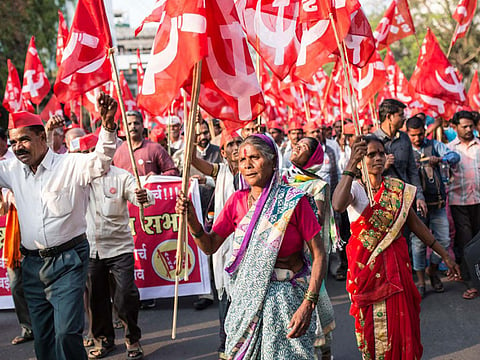The Indian farmer is angry, sad, and suicidal
Second strike in six months comes amid unpredictable yield, crashing prices, rising input values, and duress-borrowing

From June 1 to 10, farmers in six states in India are on strike. Rashtriya Kisan Mahasangh (RKM), an organisation to protect the rights of the farmers, issued a strike call. This is the second farmers’ agitation in the space of six months.
On the very first day, the protesters in some states washed streets with milk. The use of the milk is not just symbolic. There is a glut in milk production. The problem is that the cooperatives and the government just don’t have the infrastructure to turn all of it into powder for the shelf. That means the produced milk goes waste.
The base price for a litre of milk ranges between Rs20-25. A bottle of (fake) mineral water costs Rs20. The farmers want the price nearly doubled. On the face of it, this seems unreasonable. Yet, if you check, any carton of milk packaged and sold in India, costs between Rs55 to Rs70 per litre, and often more. This is just one part of the deal. The other vital part is that there is no real guarantee how much milk the cooperatives or corporates will procure from the farmer. The resultant uncertainty could be massively upsetting. Suicide then becomes a real option, not just a passing thought for the farmer as he interacts with the vast eternal elements on a daily basis.
A recent report in The Guardian said that suicide rate among American farmers is more than double the rate of war veterans. The report talks of things familiar to the lower middle class Indian farmer, who is permanently, angry, sad, and suicidal for the following reasons: unpredictable yield, crashing prices, rising input values, and duress-borrowing from banks and private lenders. Clearly, it does not much matter what the grade of the economy the farmer is working in; wherever he is, he seems to suffer and think alike.
The Guardian article quotes a farmer: “We were growing food, but couldn’t afford to buy it. We worked 80 hours a week, but we couldn’t afford to see a dentist, let alone a therapist. I remember panic when a late freeze threatened our crop, the constant fights about money, the way light swept across the walls on the days I could not force myself to get out of bed.”
No poor farmer in India is likely to equate the state of his teeth or mental health to his happiness. In the US, the pursuit of happiness is a constitutional right. In India, not even existence is. To most rural Indians, in fact, happiness is likely to be a false category of thought. They will live and die without seriously believing that happiness is their right as a human. In India, more than 270,000 farmers have died by suicide since 1995.
Rural India has a predominant representation in parliament. And rural India is predominantly a farming economy. Yet cities and corporates rule when its comes to policies. This discrepancy is not hard to explain. Urban business, industry and politics are more organised and moneyed. The decision-making bodies are far removed from villages. The politicians play to the media. The media is essentially urban in their advertisement and reader base. Naturally, once in a while, the gutters flow with milk.
In March, this year, a young leader and academic, Vijoo Krishnan, led nearly 50,000 farmers in Maharashtra in a politically subversive march that ended with the Maharashtra government waiving substantial loans to the farming community. It is possible the effectiveness of the March protests inspired the current one, though it is doubtful structural changes will happen.
There’s money to be made out of a crisis. The middlemen, the big business, and the politicians stand to gain. For example, the waiving of the loans, a ritual in charity, happens every once in a few years, at the expense of the tax payers. A rudimentary follow-up to what happens once the loans are waived, how the new freedom changes, if at all, farming practices is a rare occurrence.
Indians are by and large tolerant of lassitude and corruption, which is probably why they do not believe in their right to happiness. If things are not going to change, why bother? But when survival itself is in question, it is not just that structure of the farming business that needs to change. Character, too, is in question.
C.P. Surendran is a senior journalist based in India.


